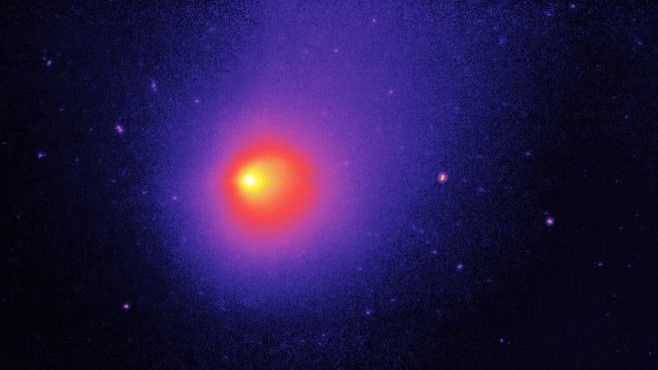In a 1st, scientists predicted that volcanic comet was due to pop 'like a Champagne bottle' -- and it
By Harry Baker published about 15 hours ago
Astronomers accurately predicted that the icy volcanic comet 29P would erupt after noticing changes in its brightness leading up to its latest explosion.

An infrared image of the coma and tail of comet 29P after an eruption on Dec. 8 2003. (Image credit: NASA/Spitzer Space Telescope )
Astronomers recently rejoiced after witnessing a bizarre volcanic comet erupt like a "Champagne bottle," spraying gas and ice through the solar system like sparkling wine. The unusual explosion was a cause for celebration because, for the first time, the researchers successfully predicted it was going to happen.
The volatile comet, known as 29P/Schwassmann-Wachmann (29P), is around 37 miles (60 kilometers) wide and takes around 14.9 years to orbit the sun. As well as being volcanic, 29P has an unusually circular orbit for a comet and rotates much more slowly than expected. It is one of around 100 comets, known as "centaurs," that have been pushed from the Kuiper Belt — a ring of icy comets that lurk beyond Neptune — into a closer orbit around the sun nearer Jupiter.
Unlike volcanoes on Earth, which eject scalding-hot magma and ash from the planet's mantle, 29P spits out extremely cold gases and ice from its supercold interior. This unusual type of volcanic activity is known as cryovolcanism, or "cold volcanism."
On April 2, scientists from the British Astronomical Association (BAA) observed a sharp spike in 29P's brightness, which was caused by light reflecting off recently ejected gas and ice, or cryomagma, in the comet's coma — the cloud of gas that surrounds a comet's body, or nucleus. The eruption was likely quite sizable given that the coma outshone the nucleus by a factor of more than 10, Spaceweather.com(opens in new tab) reported, but its exact strength has not yet been quantified.
More:
https://www.livescience.com/space/comets/in-a-1st-scientists-predicted-that-volcanic-comet-was-due-to-pop-like-a-champagne-bottle-and-it-did
